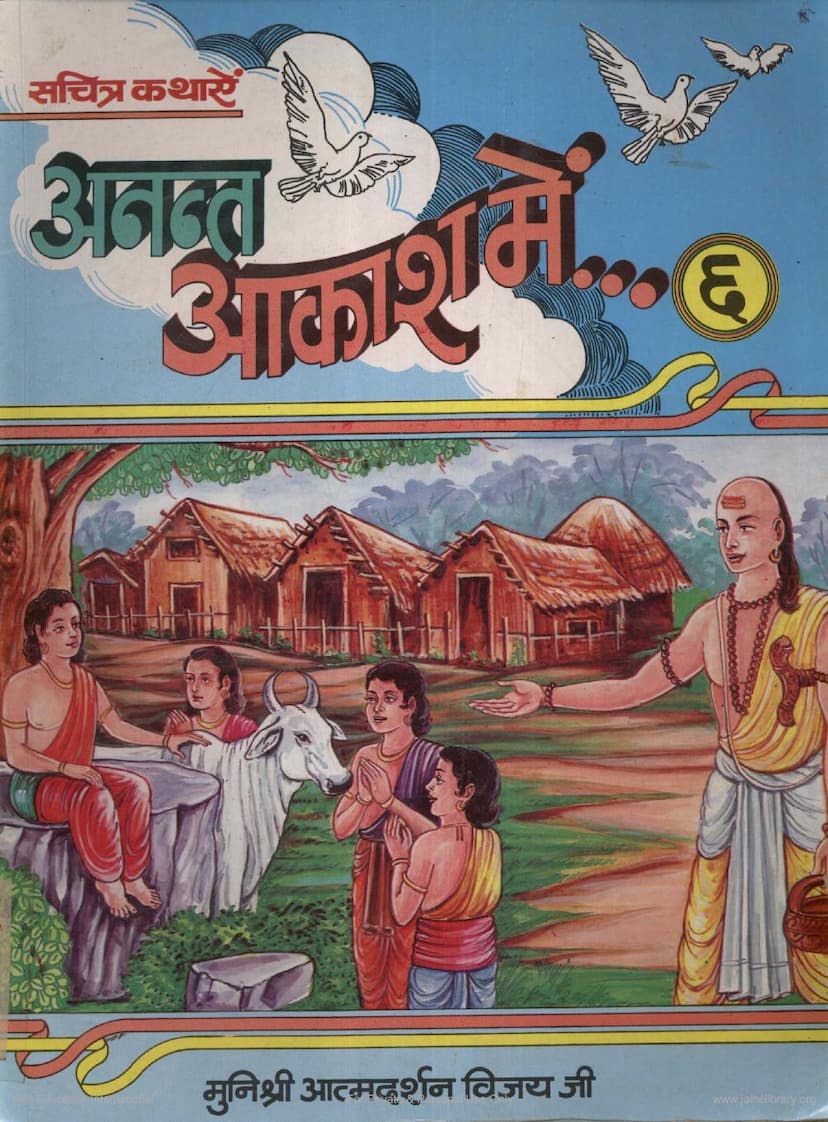Anant Akash Me
Added to library: September 1, 2025

Summary
The book "Anant Akash Me" (Meaning "In the Infinite Sky") by Munishri Atmadarshanvijay, published by Diwakar Prakashan, is a collection of illustrated stories aimed at guiding readers through the darkness of human life with the light of hope. It draws inspiration from historical and scriptural events and encourages a deep introspection of the soul.
The book is dedicated to the spiritual leader Gurudev Shri Atmadarshanvijay, and it is presented as a tribute to the 25 years of spiritual life of Munishri Kumudchandra Vijayji. The publication is supported by several individuals and families.
Author's Foreword (Page 7): The author expresses concern about the decline of moral and spiritual values in the new generation, attributing it to the influence of negative foreign cultural trends that have infiltrated Indian society. He laments the disappearance of heroic figures, scholars, and virtuous individuals from the consciousness of today's youth. The book is presented as an effort by saints to revive positive values in the new generation, even if it means adopting simpler teaching methods. The author praises Diwakar Prakashan for its excellent artwork and printing and the Hindi translator Shri Sant Dayal. He hopes readers will learn valuable lessons from the stories and illustrations.
Table of Contents (Page 8): The book contains 15 chapters, each presenting a story with a moral lesson. Some of the titles include:
- Pran, Sabko Pyare (Life is Dear to All): This story likely illustrates the value of life and perhaps the consequences of taking it.
- Madira ka Karun Anjam (The Tragic End of Alcohol): This chapter seems to be a cautionary tale about the devastating effects of alcohol consumption.
- Karmon ki Gati Nyari (The Peculiar Ways of Karma): This title suggests a narrative exploring the complex workings of karma.
- Apurva Bhratru Sneh (Unprecedented Brotherly Love): This story likely showcases the depth of love and loyalty between brothers.
- Mahima: Krishna-Narsingh ki (The Glory of Krishna Narasimha): This chapter might relate to the divine aspects or heroic deeds associated with Krishna and Narasimha.
- Krishna ka Krodh-Vijay (Krishna's Victory Over Anger): This story focuses on the importance of controlling anger, possibly through Krishna's example.
- Dharm-Khumari (Drunkenness of Dharma/Righteousness): This title might refer to the intoxicating or overwhelming power of righteousness and courage.
- Digambar Mat ke Aadi Praneata (The Founder of the Digambar Sect): This chapter is likely historical, detailing the origins of the Digambar tradition in Jainism.
- Chanakya aur Chandragupta (Chanakya and Chandragupta): This chapter will probably narrate the famous political and strategic alliance between Chanakya and Chandragupta Maurya, highlighting Chanakya's wisdom and Chandragupta's rise to power.
- Badalti Rajniti (Changing Politics): This title suggests a story related to political shifts and strategies.
- Samriddh Prachin Bharat (Prosperous Ancient India): This chapter likely portrays the wealth and prosperity of ancient India.
- Stri Hatha (A Woman's Stubbornness): This story will probably illustrate the negative consequences arising from a woman's obstinacy.
- Bhagirathi Jahnavi ka Sankshipt Itihas (A Brief History of Bhagirathi Jahnavi): This chapter will explain the origins of the names of the river Ganga.
- Tirth ki Ashatana Na Karein (Do Not Disrespect Holy Places): This story will likely emphasize the importance of respecting and not causing harm to sacred sites.
- Dev Banna Hai Ya Diwalia? (Do You Want to Become a God or a Bankrupt?): This chapter aims to guide readers towards making choices that lead to spiritual elevation rather than downfall.
The book includes a summary of the stories and their moral lessons, using the examples of historical figures and events to convey Jain principles. The overall aim is to inspire readers to lead virtuous lives, overcome vices, and strive for spiritual progress.